-
New York ICE agent arrested for stealing and selling government property
A special agent with the Immigration and Customs Enforcement (ICE) agency was recently arrested on Tuesday for allegedly stealing government property and then selling it on eBay; the agent, Steven Kucan, was a resident of Wood Ridge, New Jersey and will appear in a federal court in Newark, New Jersey; Kucan reportedly sold approximately $37,000 worth of ICE property using an eBay account that was opened in the name of an elderly relative; stolen items include printer cartridges, camera lenses, film, combat lights for M-4 rifles, and even a special diving suit designed to prevent hypothermia in cold water
-
-
A team of robots collaborate in exploration, map building
Researchers have developed an advanced autonomous capability for first responders, law enforcement, and the military: a group of robots, working by themselves and communicating only with one another, divide up among themselves a variety of exploration tasks — for example, they can go into a building and within minutes transmit a detailed floor map to humans waiting at a command center nearby
-
-
Infrared sensors could help police detect suicide vests
Sophisticated infrared sensors originally designed for the U.S. military could soon be used by local police departments to detect suicide bombers; Thermal Matrix USA initially designed its Access Counter IED Technology system to assist military personnel in Iraq and Afghanistan identify potential suicide bombers, but hopes to create a model that local law enforcement agencies can deploy; the company has modified its product to significantly reduce its size, weight, and deployment time to be more practical; the devices are capable of detecting any hidden objects including knives, guns, plastics, and even liquids
-
-
States turning to new "familial DNA" tests, practice faces legal hurdles
Law enforcement officials in several states across the United States are hoping to obtain the legal authority to begin conducting “familial DNA” testing, a process which could greatly increase the number of suspects identified in violent crimes; while DNA is often found at crime scenes using familial DNA would allow law enforcement officials to use DNA from a suspected criminal’s relatives to positively identify them; currently only California and Texas have laws in place that allow investigators to conduct familial DNA tests; Virginia, Pennsylvania, and Florida could soon join their ranks; the practice is still quite new and faces legal challenges and must be approved by a state’s courts
-
-
Arlington, Texas hopes to keep aerial drone
The police department of Arlington, Texas is examining ways to fund an unmanned surveillance drone; the drone was originally purchased with grant money from DHS to assist local police officers with security during Super Bowl XLV held at Cowboys Stadium in Arlington last February; the drone is still technically owned its unidentified manufacturer and the City Council is debating how to pay for the drone’s operation and maintenance
-
-
West Virginia lottery winner donates $1 million to local police and fire departments
After winning the lottery, a West Virginia resident has donated nearly $1 million to local police and fire departments; last Thursday, W. Randy Smith purchased six Ford F-350 pickup trucks equipped with snow plows and snow blowers for six fire departments in Berkeley County; Smith says he decided to purchase the vehicles after severe winter storms last year left many emergency vehicles unable to reach their destinations; Smith’s generosity comes after winning nearly $80 million last August in the Powerball lottery; Smith has also made several other donations including new four wheel drive ambulances for the Hedgesville and Baker Heights fire departments which cost $280,000
-
-
Audit finds lax security at money printing facility
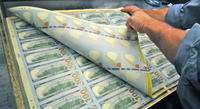
The U.S. Treasury Department’s inspector general found that newly printed $100 bills were inadequately protected at Bureau of Engraving and Printing plants; about $54.4 million new $100 bills and $4 million uncut sheets of notes had “inadequate security” at a Bureau of Engraving and Printing (BEP) plant in Washington, D.C.; the production area in the Washington facility has over two dozen windows that lacked protective security features, and more than 200 employees have access to the area
-
-
DHS official: Muslims will not be profiled following bin Laden's death
In a recent meeting with local Muslims in Detroit, a senior DHS official assured Muslim-Americans that they would not be subject to racial profiling following the death of Osama bin Laden; last week in Dearborn Heights, Michigan, federal officials met with Arab-American and Muslim community leaders to answer any questions and address their concerns; local Muslims were particularly worried that they would be profiled as authorities were on a heightened state of awareness for fear of a retaliatory attack; to help ease fears, Margo Schlanger, the national head of the office of Civil Rights and Civil Liberties at DHS, assured Muslims that the government was not giving special scrutiny to any ethnic groups at this time, including Muslims
-
-
Denying foreign aid to countries with outstanding NYC parking tickets
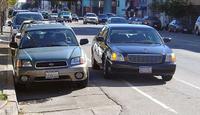
New York City is home to 289 foreign missions and consulates, and their foreign diplomats have incurred more than $17.2 million in parking fines; these fines were issued due to safety violations, including the blocking of fire hydrants, which put the safety of NYC residents at risk; there is already a law on the books stating that 110 percent of the total unpaid parking fines owed to NYC and the District of Columbia are to be withheld from foreign aid and obligations to the countries at fault, but so far this law has not been enforced; three New York House representatives want to change that, telling other countries: pay your NYC parking tickets or forget about foreign aid
-
-
Quadrotor micro UAVs go mainstream
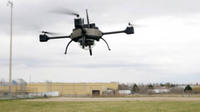
A Canadian company develops small quadrotor micro UAVs for use by law enforcement, first responders, and the military; the company’s Scout has a range of three kilometers and maximum speed of 50 kilometers per hour; it can fly through wind gusts of up to 80 km/h, and can cope with harsh weather conditions; the Scout is light — it weighs about one kilogram — and can be carried disassembled in a case and be assembled quickly by snapping its rotors into the main body
-
-
ATF cracks down on bombs used to scare seals
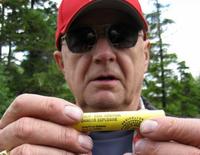
Much to the frustration of California fishermen, the U.S. Bureau of Alcohol, Tobacco, Firearms, and Explosives (ATF) is starting to regulate the firecrackers used to scare away seals from fishing lines; beginning 1 May, ATF officials will begin enforcing a federal law that mandates anyone who purchases the seal “bombs” to obtain a special permit and clear a background check in order to prevent terrorists or criminals from using them; the bombs resemble M-80 firecrackers and are shot from a gun; fishermen and farmers use them to scare away animals like hungry birds or seals
-
-
Arizona police deploy iris scanners and facial biometrics to identify inmates
Local police departments in Arizona have begun using facial biometrics and iris scanning technology to identify inmates and registered sex offenders; officers with the Pinal County Sheriff’s department have entered roughly 1,500 inmates and 700 sex offenders into a national database to better identify, register, and track inmates; the scans come as part of a broader effort led by the National Sheriff’s Association (NSA) and the U.S. Justice Department; beginning in 2009, the Justice Department awarded $500,000 to help roughly forty-five law enforcement agencies throughout the United States to purchase iris scanners from BI2 Technologies
-
-
Surveillance cams removed from Muslim neighborhood in U.K.
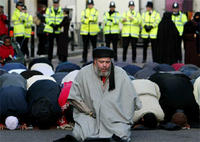
Local law enforcement officials in the United Kingdom have begun to uninstall more than 200 surveillance cameras from a predominately Muslim neighborhood in Birmingham; the installation of the cameras was met with fierce criticism, especially after residents had learned that some cameras were hidden; residents were particularly incensed because they were not consulted during the planning process; in October Chief Constable Chris Sims agreed to remove the cameras in order to regain the trust of the community
-
-
Growth of adolescent fingerprints can be predicted
One difficulty law enforcement faces is recognizing whether the fingerprints taken during adolescence and in adulthood were those of the same individual; German researchers have developed a new procedure enabling the growth of fingerprints to be predicted
-
-
DHS struggles to detect billions in cash smuggled across U.S.-Mexico border

Each year Mexican drug cartels smuggle billions of dollars of cash into and out of the United States, yet despite their best efforts, DHS officials are struggling to stem the flow of cash that is fueling the drug wars; the Department of Justice estimates that each year Mexican drug cartels smuggle as much as $39 billion in cash across the southern border; DHS officials say that it is having a difficult time detecting cash; officials are actively seeking to develop technological solutions to help detect individuals smuggling large amounts of cash across the border; but the technology to accomplish this goals may not exist yet as there are several large technical and logistical hurdles that must be overcome
-
More headlines
The long view
How Male Grievance Fuels Radicalization and Extremist Violence
Social extremism is evolving in reach and form. While traditional racial supremacy ideologies remain, contemporary movements are now often fueled by something more personal and emotionally resonant: male grievance.
